SITXHRM003 Lead and Manage People - Cookery Assessment Pack ACTE
VerifiedAdded on 2024/07/02
|67
|14506
|234
Homework Assignment
AI Summary
This assessment pack for SITXHRM003 Lead and Manage People, part of the SIT40516 Certificate IV in Commercial Cookery at Adelaide College of Technical Education (ACTE), includes various assessment methods such as checkpoints, quizzes, written response questions, and practical demonstrations. It evaluates a student's ability to understand and apply principles of leading and managing people within a hospitality context. The pack outlines instructions for assessors and learners, plagiarism policies, evidence requirements, and resources, ensuring a structured approach to competency assessment through online submissions via the Futura platform and direct practical evaluations.
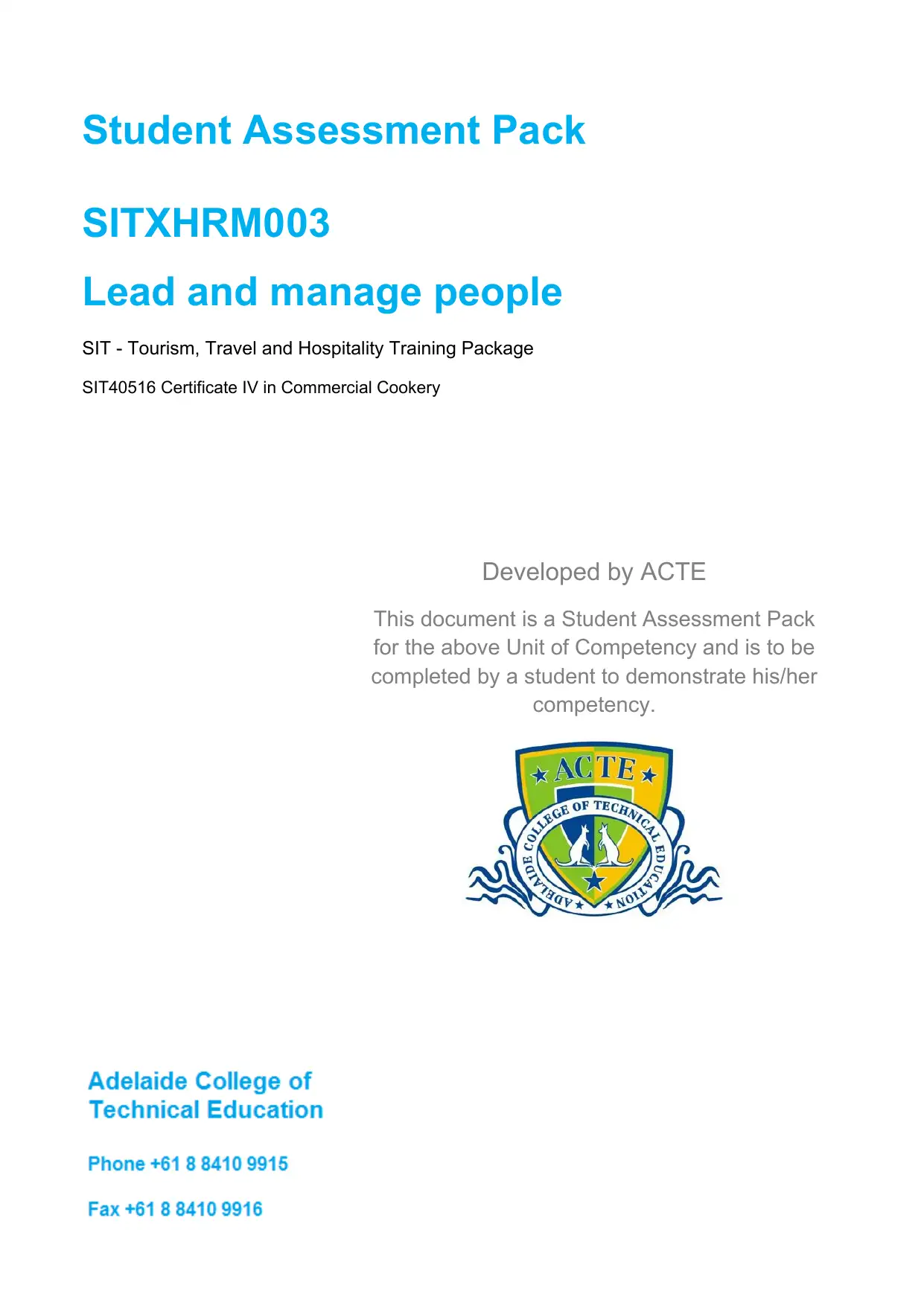
Developed by ACTE
This document is a Student Assessment Pack
for the above Unit of Competency and is to be
completed by a student to demonstrate his/her
competency.
Student Assessment Pack
SITXHRM003
Lead and manage people
SIT - Tourism, Travel and Hospitality Training Package
SIT40516 Certificate IV in Commercial Cookery
This document is a Student Assessment Pack
for the above Unit of Competency and is to be
completed by a student to demonstrate his/her
competency.
Student Assessment Pack
SITXHRM003
Lead and manage people
SIT - Tourism, Travel and Hospitality Training Package
SIT40516 Certificate IV in Commercial Cookery
Paraphrase This Document
Need a fresh take? Get an instant paraphrase of this document with our AI Paraphraser
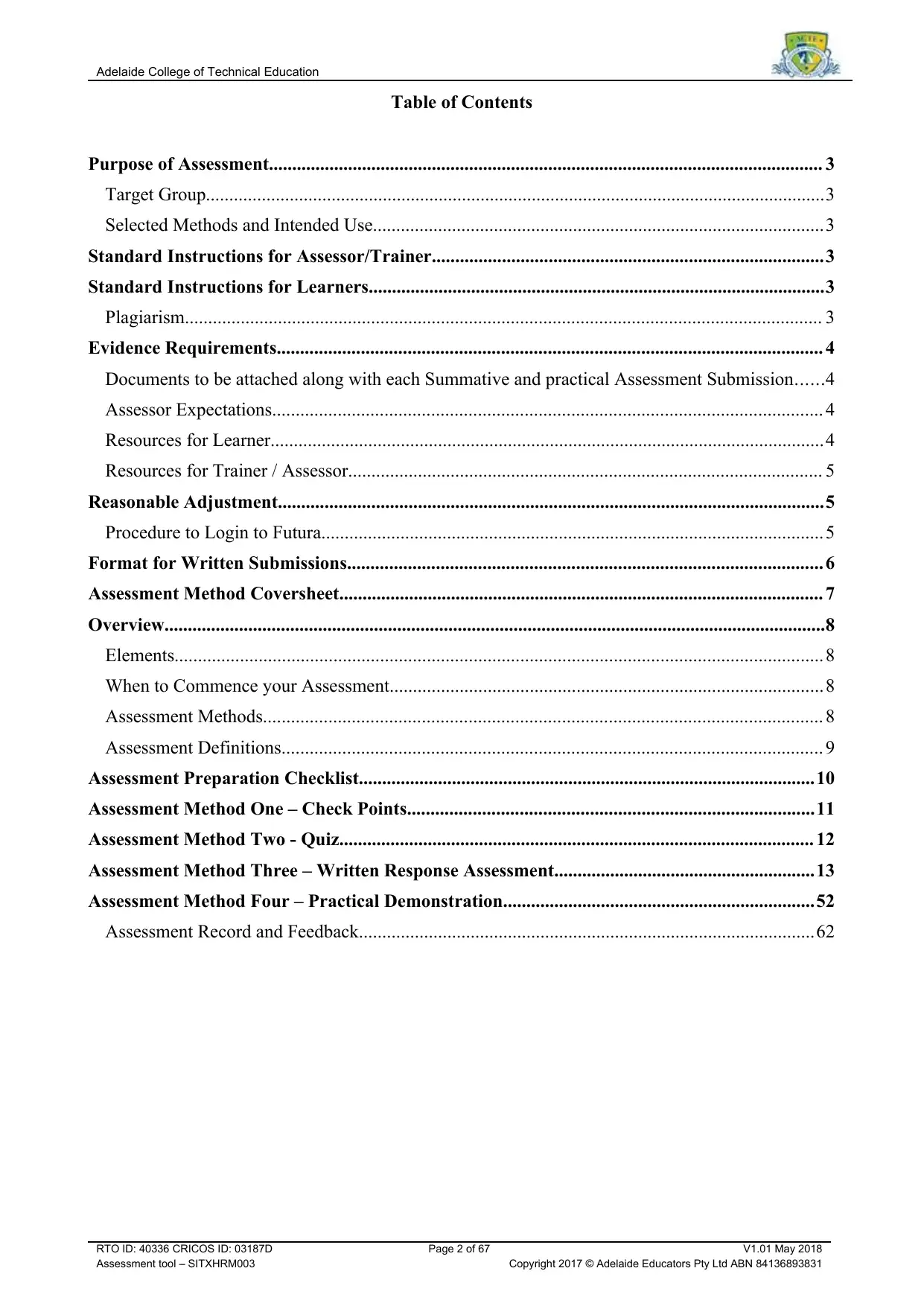
Adelaide College of Technical Education
Table of Contents
Purpose of Assessment....................................................................................................................... 3
Target Group.....................................................................................................................................3
Selected Methods and Intended Use.................................................................................................3
Standard Instructions for Assessor/Trainer....................................................................................3
Standard Instructions for Learners..................................................................................................3
Plagiarism......................................................................................................................................... 3
Evidence Requirements..................................................................................................................... 4
Documents to be attached along with each Summative and practical Assessment Submission......4
Assessor Expectations...................................................................................................................... 4
Resources for Learner.......................................................................................................................4
Resources for Trainer / Assessor...................................................................................................... 5
Reasonable Adjustment.....................................................................................................................5
Procedure to Login to Futura............................................................................................................5
Format for Written Submissions...................................................................................................... 6
Assessment Method Coversheet........................................................................................................ 7
Overview..............................................................................................................................................8
Elements...........................................................................................................................................8
When to Commence your Assessment.............................................................................................8
Assessment Methods........................................................................................................................ 8
Assessment Definitions.................................................................................................................... 9
Assessment Preparation Checklist..................................................................................................10
Assessment Method One – Check Points.......................................................................................11
Assessment Method Two - Quiz...................................................................................................... 12
Assessment Method Three – Written Response Assessment........................................................13
Assessment Method Four – Practical Demonstration...................................................................52
Assessment Record and Feedback..................................................................................................62
RTO ID: 40336 CRICOS ID: 03187D Page 2 of 67 V1.01 May 2018
Assessment tool – SITXHRM003 Copyright 2017 © Adelaide Educators Pty Ltd ABN 84136893831
Table of Contents
Purpose of Assessment....................................................................................................................... 3
Target Group.....................................................................................................................................3
Selected Methods and Intended Use.................................................................................................3
Standard Instructions for Assessor/Trainer....................................................................................3
Standard Instructions for Learners..................................................................................................3
Plagiarism......................................................................................................................................... 3
Evidence Requirements..................................................................................................................... 4
Documents to be attached along with each Summative and practical Assessment Submission......4
Assessor Expectations...................................................................................................................... 4
Resources for Learner.......................................................................................................................4
Resources for Trainer / Assessor...................................................................................................... 5
Reasonable Adjustment.....................................................................................................................5
Procedure to Login to Futura............................................................................................................5
Format for Written Submissions...................................................................................................... 6
Assessment Method Coversheet........................................................................................................ 7
Overview..............................................................................................................................................8
Elements...........................................................................................................................................8
When to Commence your Assessment.............................................................................................8
Assessment Methods........................................................................................................................ 8
Assessment Definitions.................................................................................................................... 9
Assessment Preparation Checklist..................................................................................................10
Assessment Method One – Check Points.......................................................................................11
Assessment Method Two - Quiz...................................................................................................... 12
Assessment Method Three – Written Response Assessment........................................................13
Assessment Method Four – Practical Demonstration...................................................................52
Assessment Record and Feedback..................................................................................................62
RTO ID: 40336 CRICOS ID: 03187D Page 2 of 67 V1.01 May 2018
Assessment tool – SITXHRM003 Copyright 2017 © Adelaide Educators Pty Ltd ABN 84136893831
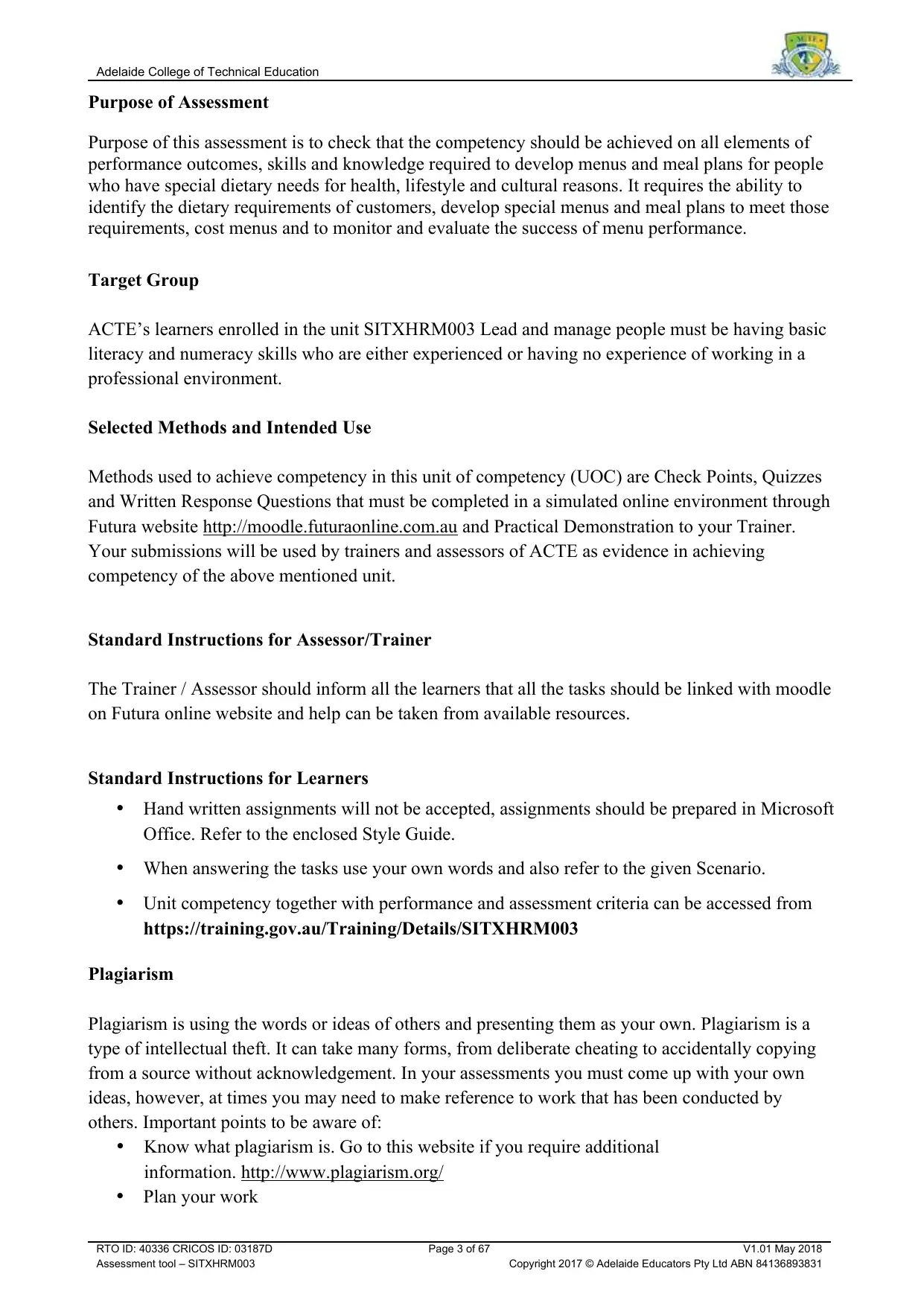
Adelaide College of Technical Education
Purpose of Assessment
Purpose of this assessment is to check that the competency should be achieved on all elements of
performance outcomes, skills and knowledge required to develop menus and meal plans for people
who have special dietary needs for health, lifestyle and cultural reasons. It requires the ability to
identify the dietary requirements of customers, develop special menus and meal plans to meet those
requirements, cost menus and to monitor and evaluate the success of menu performance.
Target Group
ACTE’s learners enrolled in the unit SITXHRM003 Lead and manage people must be having basic
literacy and numeracy skills who are either experienced or having no experience of working in a
professional environment.
Selected Methods and Intended Use
Methods used to achieve competency in this unit of competency (UOC) are Check Points, Quizzes
and Written Response Questions that must be completed in a simulated online environment through
Futura website http://moodle.futuraonline.com.au and Practical Demonstration to your Trainer.
Your submissions will be used by trainers and assessors of ACTE as evidence in achieving
competency of the above mentioned unit.
Standard Instructions for Assessor/Trainer
The Trainer / Assessor should inform all the learners that all the tasks should be linked with moodle
on Futura online website and help can be taken from available resources.
Standard Instructions for Learners
Hand written assignments will not be accepted, assignments should be prepared in Microsoft
Office. Refer to the enclosed Style Guide.
When answering the tasks use your own words and also refer to the given Scenario.
Unit competency together with performance and assessment criteria can be accessed from
https://training.gov.au/Training/Details/SITXHRM003
Plagiarism
Plagiarism is using the words or ideas of others and presenting them as your own. Plagiarism is a
type of intellectual theft. It can take many forms, from deliberate cheating to accidentally copying
from a source without acknowledgement. In your assessments you must come up with your own
ideas, however, at times you may need to make reference to work that has been conducted by
others. Important points to be aware of:
Know what plagiarism is. Go to this website if you require additional
information. http://www.plagiarism.org/
Plan your work
RTO ID: 40336 CRICOS ID: 03187D Page 3 of 67 V1.01 May 2018
Assessment tool – SITXHRM003 Copyright 2017 © Adelaide Educators Pty Ltd ABN 84136893831
Purpose of Assessment
Purpose of this assessment is to check that the competency should be achieved on all elements of
performance outcomes, skills and knowledge required to develop menus and meal plans for people
who have special dietary needs for health, lifestyle and cultural reasons. It requires the ability to
identify the dietary requirements of customers, develop special menus and meal plans to meet those
requirements, cost menus and to monitor and evaluate the success of menu performance.
Target Group
ACTE’s learners enrolled in the unit SITXHRM003 Lead and manage people must be having basic
literacy and numeracy skills who are either experienced or having no experience of working in a
professional environment.
Selected Methods and Intended Use
Methods used to achieve competency in this unit of competency (UOC) are Check Points, Quizzes
and Written Response Questions that must be completed in a simulated online environment through
Futura website http://moodle.futuraonline.com.au and Practical Demonstration to your Trainer.
Your submissions will be used by trainers and assessors of ACTE as evidence in achieving
competency of the above mentioned unit.
Standard Instructions for Assessor/Trainer
The Trainer / Assessor should inform all the learners that all the tasks should be linked with moodle
on Futura online website and help can be taken from available resources.
Standard Instructions for Learners
Hand written assignments will not be accepted, assignments should be prepared in Microsoft
Office. Refer to the enclosed Style Guide.
When answering the tasks use your own words and also refer to the given Scenario.
Unit competency together with performance and assessment criteria can be accessed from
https://training.gov.au/Training/Details/SITXHRM003
Plagiarism
Plagiarism is using the words or ideas of others and presenting them as your own. Plagiarism is a
type of intellectual theft. It can take many forms, from deliberate cheating to accidentally copying
from a source without acknowledgement. In your assessments you must come up with your own
ideas, however, at times you may need to make reference to work that has been conducted by
others. Important points to be aware of:
Know what plagiarism is. Go to this website if you require additional
information. http://www.plagiarism.org/
Plan your work
RTO ID: 40336 CRICOS ID: 03187D Page 3 of 67 V1.01 May 2018
Assessment tool – SITXHRM003 Copyright 2017 © Adelaide Educators Pty Ltd ABN 84136893831
⊘ This is a preview!⊘
Do you want full access?
Subscribe today to unlock all pages.

Trusted by 1+ million students worldwide
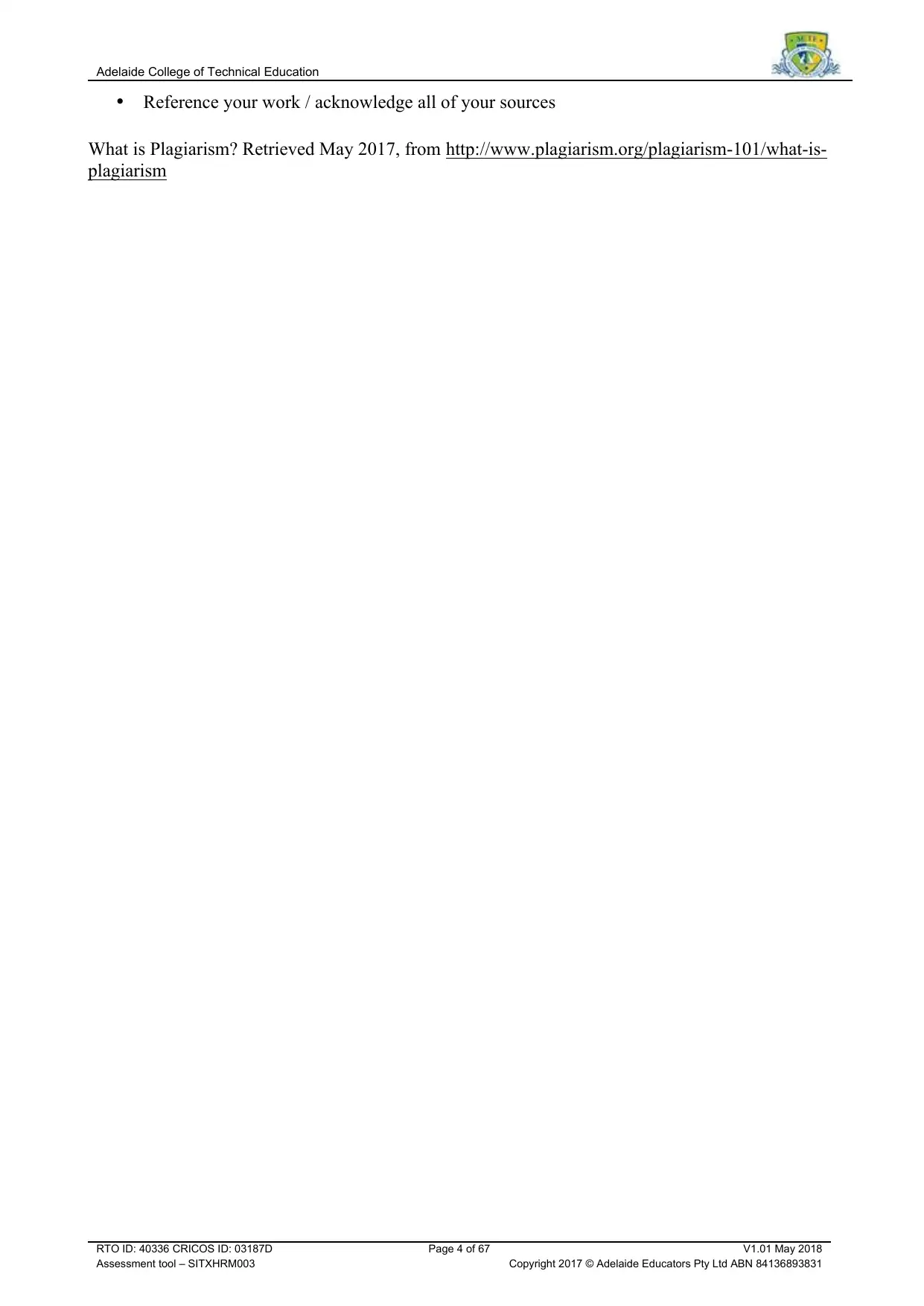
Adelaide College of Technical Education
Reference your work / acknowledge all of your sources
What is Plagiarism? Retrieved May 2017, from http://www.plagiarism.org/plagiarism-101/what-is-
plagiarism
RTO ID: 40336 CRICOS ID: 03187D Page 4 of 67 V1.01 May 2018
Assessment tool – SITXHRM003 Copyright 2017 © Adelaide Educators Pty Ltd ABN 84136893831
Reference your work / acknowledge all of your sources
What is Plagiarism? Retrieved May 2017, from http://www.plagiarism.org/plagiarism-101/what-is-
plagiarism
RTO ID: 40336 CRICOS ID: 03187D Page 4 of 67 V1.01 May 2018
Assessment tool – SITXHRM003 Copyright 2017 © Adelaide Educators Pty Ltd ABN 84136893831
Paraphrase This Document
Need a fresh take? Get an instant paraphrase of this document with our AI Paraphraser
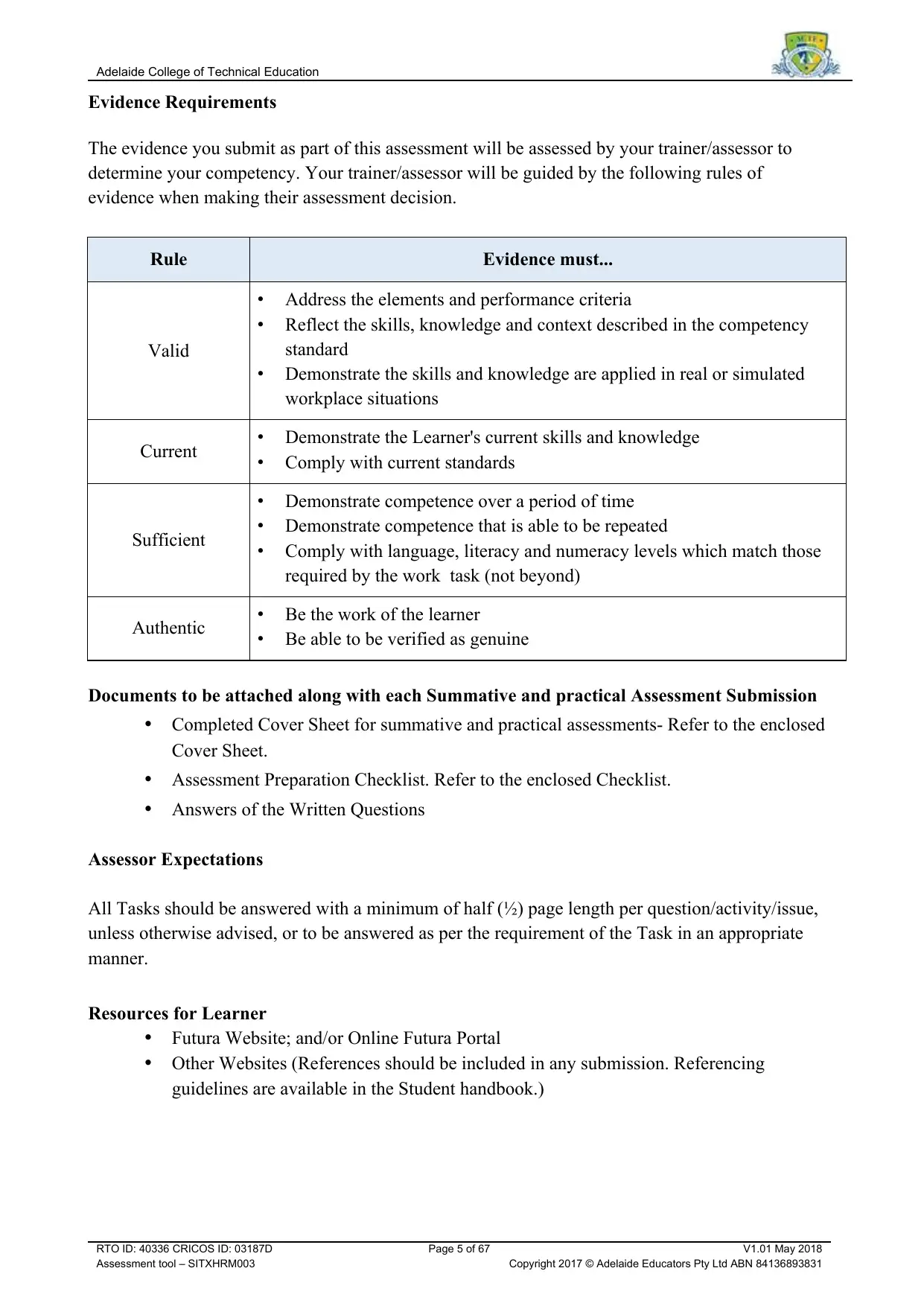
Adelaide College of Technical Education
Evidence Requirements
The evidence you submit as part of this assessment will be assessed by your trainer/assessor to
determine your competency. Your trainer/assessor will be guided by the following rules of
evidence when making their assessment decision.
Rule Evidence must...
Valid
• Address the elements and performance criteria
• Reflect the skills, knowledge and context described in the competency
standard
• Demonstrate the skills and knowledge are applied in real or simulated
workplace situations
Current • Demonstrate the Learner's current skills and knowledge
• Comply with current standards
Sufficient
• Demonstrate competence over a period of time
• Demonstrate competence that is able to be repeated
• Comply with language, literacy and numeracy levels which match those
required by the work task (not beyond)
Authentic • Be the work of the learner
• Be able to be verified as genuine
Documents to be attached along with each Summative and practical Assessment Submission
Completed Cover Sheet for summative and practical assessments- Refer to the enclosed
Cover Sheet.
Assessment Preparation Checklist. Refer to the enclosed Checklist.
Answers of the Written Questions
Assessor Expectations
All Tasks should be answered with a minimum of half (½) page length per question/activity/issue,
unless otherwise advised, or to be answered as per the requirement of the Task in an appropriate
manner.
Resources for Learner
Futura Website; and/or Online Futura Portal
Other Websites (References should be included in any submission. Referencing
guidelines are available in the Student handbook.)
RTO ID: 40336 CRICOS ID: 03187D Page 5 of 67 V1.01 May 2018
Assessment tool – SITXHRM003 Copyright 2017 © Adelaide Educators Pty Ltd ABN 84136893831
Evidence Requirements
The evidence you submit as part of this assessment will be assessed by your trainer/assessor to
determine your competency. Your trainer/assessor will be guided by the following rules of
evidence when making their assessment decision.
Rule Evidence must...
Valid
• Address the elements and performance criteria
• Reflect the skills, knowledge and context described in the competency
standard
• Demonstrate the skills and knowledge are applied in real or simulated
workplace situations
Current • Demonstrate the Learner's current skills and knowledge
• Comply with current standards
Sufficient
• Demonstrate competence over a period of time
• Demonstrate competence that is able to be repeated
• Comply with language, literacy and numeracy levels which match those
required by the work task (not beyond)
Authentic • Be the work of the learner
• Be able to be verified as genuine
Documents to be attached along with each Summative and practical Assessment Submission
Completed Cover Sheet for summative and practical assessments- Refer to the enclosed
Cover Sheet.
Assessment Preparation Checklist. Refer to the enclosed Checklist.
Answers of the Written Questions
Assessor Expectations
All Tasks should be answered with a minimum of half (½) page length per question/activity/issue,
unless otherwise advised, or to be answered as per the requirement of the Task in an appropriate
manner.
Resources for Learner
Futura Website; and/or Online Futura Portal
Other Websites (References should be included in any submission. Referencing
guidelines are available in the Student handbook.)
RTO ID: 40336 CRICOS ID: 03187D Page 5 of 67 V1.01 May 2018
Assessment tool – SITXHRM003 Copyright 2017 © Adelaide Educators Pty Ltd ABN 84136893831
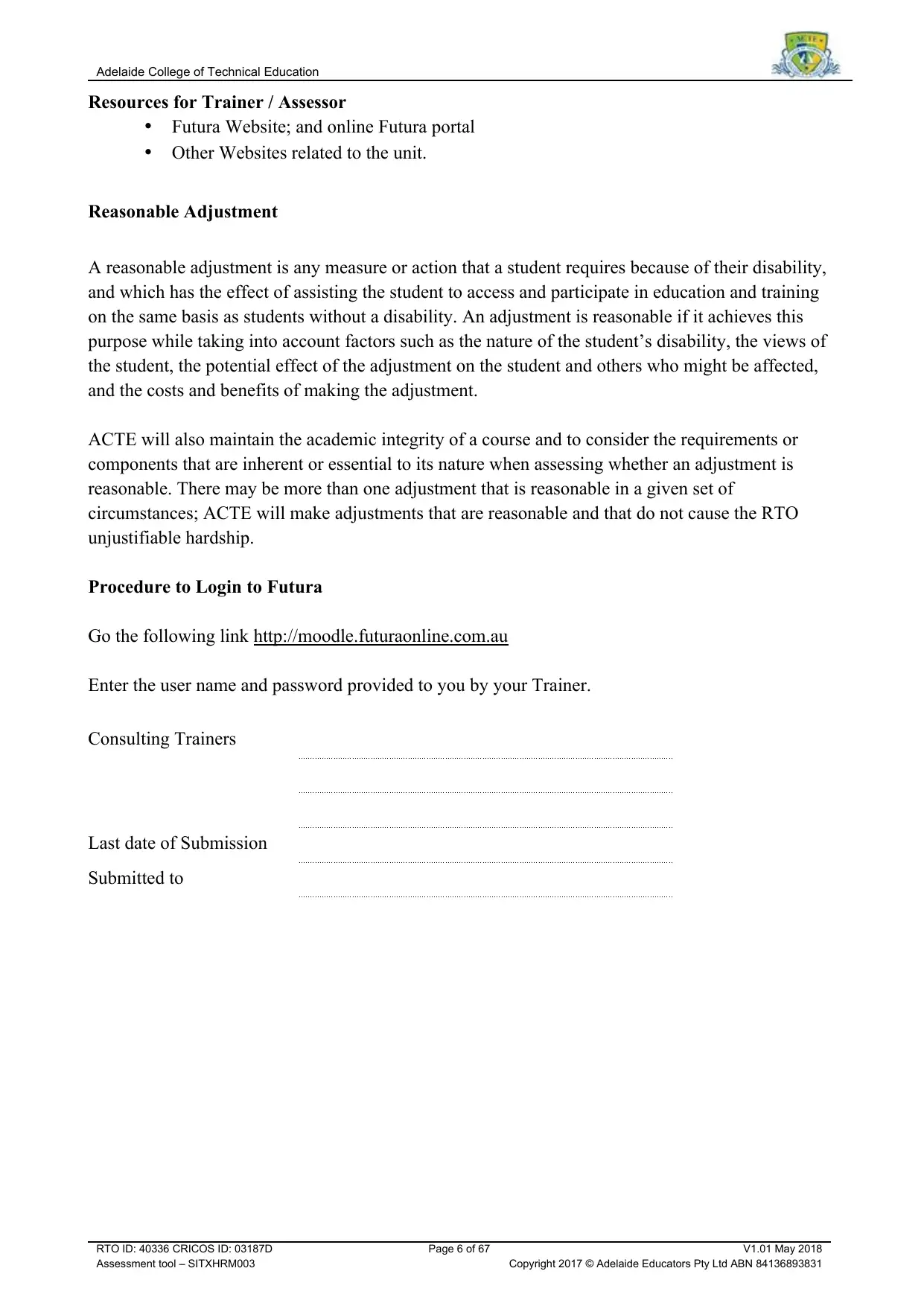
Adelaide College of Technical Education
Resources for Trainer / Assessor
Futura Website; and online Futura portal
Other Websites related to the unit.
Reasonable Adjustment
A reasonable adjustment is any measure or action that a student requires because of their disability,
and which has the effect of assisting the student to access and participate in education and training
on the same basis as students without a disability. An adjustment is reasonable if it achieves this
purpose while taking into account factors such as the nature of the student’s disability, the views of
the student, the potential effect of the adjustment on the student and others who might be affected,
and the costs and benefits of making the adjustment.
ACTE will also maintain the academic integrity of a course and to consider the requirements or
components that are inherent or essential to its nature when assessing whether an adjustment is
reasonable. There may be more than one adjustment that is reasonable in a given set of
circumstances; ACTE will make adjustments that are reasonable and that do not cause the RTO
unjustifiable hardship.
Procedure to Login to Futura
Go the following link http://moodle.futuraonline.com.au
Enter the user name and password provided to you by your Trainer.
Consulting Trainers
Last date of Submission
Submitted to
RTO ID: 40336 CRICOS ID: 03187D Page 6 of 67 V1.01 May 2018
Assessment tool – SITXHRM003 Copyright 2017 © Adelaide Educators Pty Ltd ABN 84136893831
Resources for Trainer / Assessor
Futura Website; and online Futura portal
Other Websites related to the unit.
Reasonable Adjustment
A reasonable adjustment is any measure or action that a student requires because of their disability,
and which has the effect of assisting the student to access and participate in education and training
on the same basis as students without a disability. An adjustment is reasonable if it achieves this
purpose while taking into account factors such as the nature of the student’s disability, the views of
the student, the potential effect of the adjustment on the student and others who might be affected,
and the costs and benefits of making the adjustment.
ACTE will also maintain the academic integrity of a course and to consider the requirements or
components that are inherent or essential to its nature when assessing whether an adjustment is
reasonable. There may be more than one adjustment that is reasonable in a given set of
circumstances; ACTE will make adjustments that are reasonable and that do not cause the RTO
unjustifiable hardship.
Procedure to Login to Futura
Go the following link http://moodle.futuraonline.com.au
Enter the user name and password provided to you by your Trainer.
Consulting Trainers
Last date of Submission
Submitted to
RTO ID: 40336 CRICOS ID: 03187D Page 6 of 67 V1.01 May 2018
Assessment tool – SITXHRM003 Copyright 2017 © Adelaide Educators Pty Ltd ABN 84136893831
⊘ This is a preview!⊘
Do you want full access?
Subscribe today to unlock all pages.

Trusted by 1+ million students worldwide
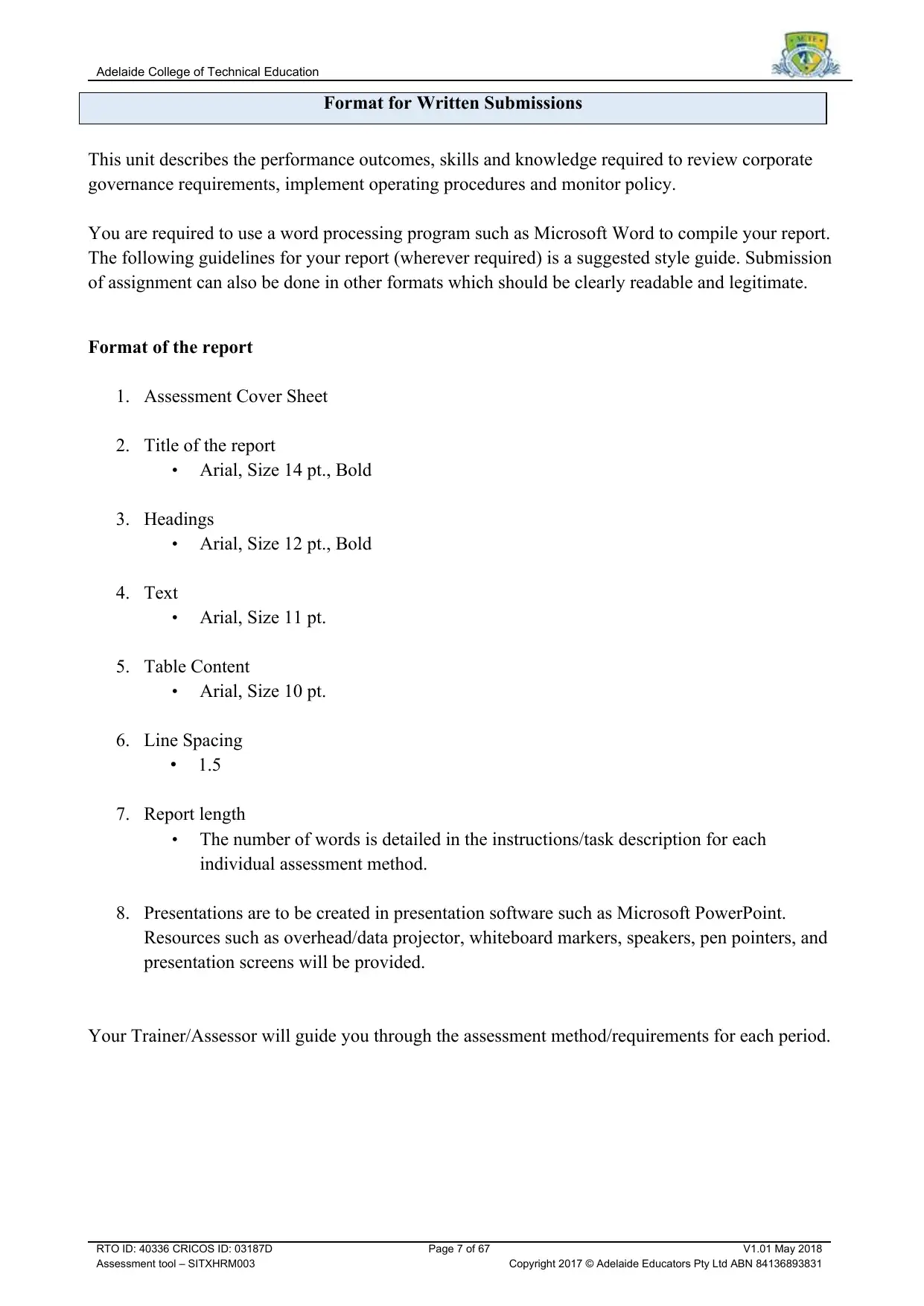
Adelaide College of Technical Education
Format for Written Submissions
This unit describes the performance outcomes, skills and knowledge required to review corporate
governance requirements, implement operating procedures and monitor policy.
You are required to use a word processing program such as Microsoft Word to compile your report.
The following guidelines for your report (wherever required) is a suggested style guide. Submission
of assignment can also be done in other formats which should be clearly readable and legitimate.
Format of the report
1. Assessment Cover Sheet
2. Title of the report
• Arial, Size 14 pt., Bold
3. Headings
• Arial, Size 12 pt., Bold
4. Text
• Arial, Size 11 pt.
5. Table Content
• Arial, Size 10 pt.
6. Line Spacing
• 1.5
7. Report length
• The number of words is detailed in the instructions/task description for each
individual assessment method.
8. Presentations are to be created in presentation software such as Microsoft PowerPoint.
Resources such as overhead/data projector, whiteboard markers, speakers, pen pointers, and
presentation screens will be provided.
Your Trainer/Assessor will guide you through the assessment method/requirements for each period.
RTO ID: 40336 CRICOS ID: 03187D Page 7 of 67 V1.01 May 2018
Assessment tool – SITXHRM003 Copyright 2017 © Adelaide Educators Pty Ltd ABN 84136893831
Format for Written Submissions
This unit describes the performance outcomes, skills and knowledge required to review corporate
governance requirements, implement operating procedures and monitor policy.
You are required to use a word processing program such as Microsoft Word to compile your report.
The following guidelines for your report (wherever required) is a suggested style guide. Submission
of assignment can also be done in other formats which should be clearly readable and legitimate.
Format of the report
1. Assessment Cover Sheet
2. Title of the report
• Arial, Size 14 pt., Bold
3. Headings
• Arial, Size 12 pt., Bold
4. Text
• Arial, Size 11 pt.
5. Table Content
• Arial, Size 10 pt.
6. Line Spacing
• 1.5
7. Report length
• The number of words is detailed in the instructions/task description for each
individual assessment method.
8. Presentations are to be created in presentation software such as Microsoft PowerPoint.
Resources such as overhead/data projector, whiteboard markers, speakers, pen pointers, and
presentation screens will be provided.
Your Trainer/Assessor will guide you through the assessment method/requirements for each period.
RTO ID: 40336 CRICOS ID: 03187D Page 7 of 67 V1.01 May 2018
Assessment tool – SITXHRM003 Copyright 2017 © Adelaide Educators Pty Ltd ABN 84136893831
Paraphrase This Document
Need a fresh take? Get an instant paraphrase of this document with our AI Paraphraser
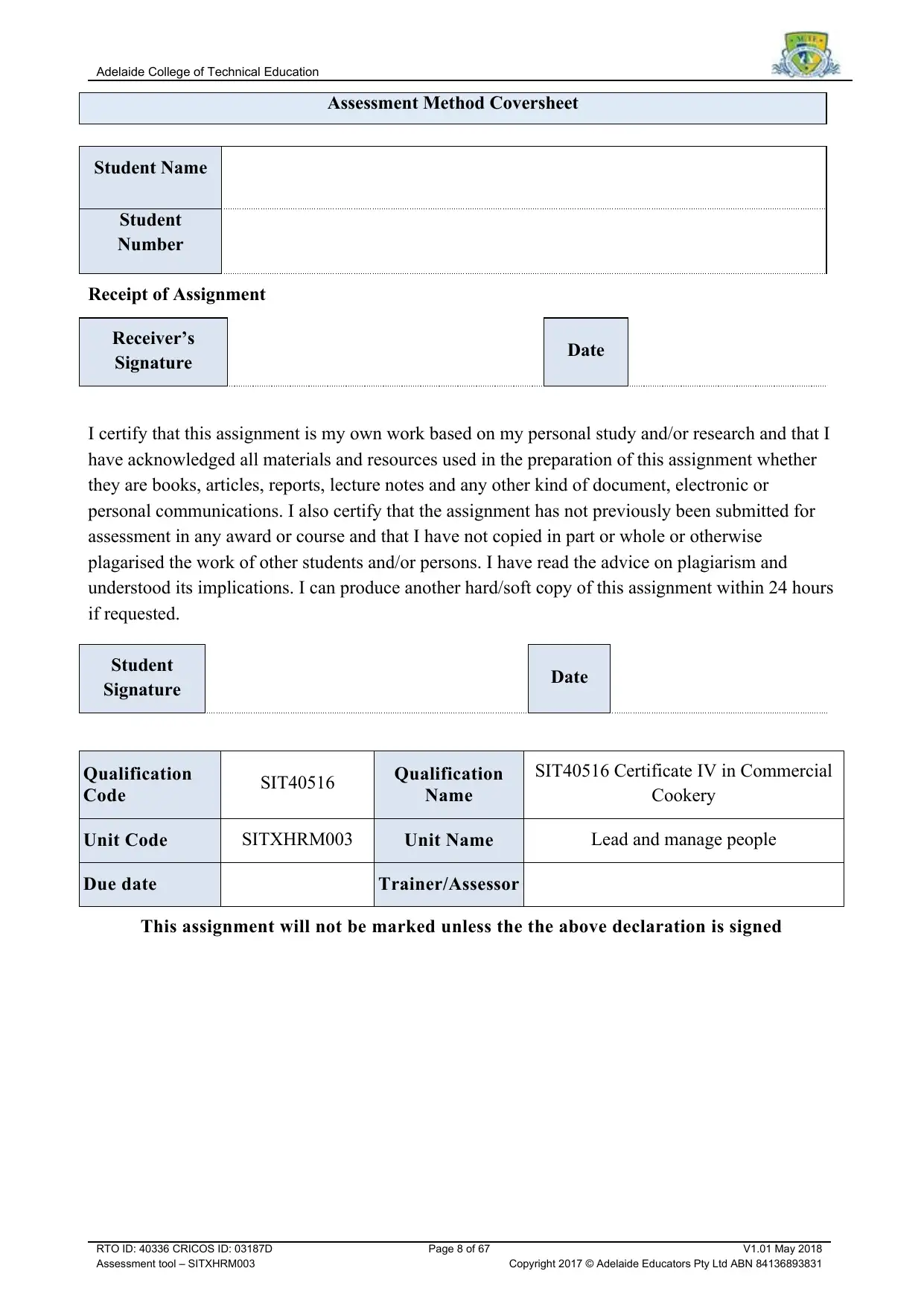
Adelaide College of Technical Education
Assessment Method Coversheet
Student Name
Student
Number
Receipt of Assignment
Receiver’s
Signature Date
I certify that this assignment is my own work based on my personal study and/or research and that I
have acknowledged all materials and resources used in the preparation of this assignment whether
they are books, articles, reports, lecture notes and any other kind of document, electronic or
personal communications. I also certify that the assignment has not previously been submitted for
assessment in any award or course and that I have not copied in part or whole or otherwise
plagarised the work of other students and/or persons. I have read the advice on plagiarism and
understood its implications. I can produce another hard/soft copy of this assignment within 24 hours
if requested.
Student
Signature Date
Qualification
Code SIT40516 Qualification
Name
SIT40516 Certificate IV in Commercial
Cookery
Unit Code SITXHRM003 Unit Name Lead and manage people
Due date Trainer/Assessor
This assignment will not be marked unless the the above declaration is signed
RTO ID: 40336 CRICOS ID: 03187D Page 8 of 67 V1.01 May 2018
Assessment tool – SITXHRM003 Copyright 2017 © Adelaide Educators Pty Ltd ABN 84136893831
Assessment Method Coversheet
Student Name
Student
Number
Receipt of Assignment
Receiver’s
Signature Date
I certify that this assignment is my own work based on my personal study and/or research and that I
have acknowledged all materials and resources used in the preparation of this assignment whether
they are books, articles, reports, lecture notes and any other kind of document, electronic or
personal communications. I also certify that the assignment has not previously been submitted for
assessment in any award or course and that I have not copied in part or whole or otherwise
plagarised the work of other students and/or persons. I have read the advice on plagiarism and
understood its implications. I can produce another hard/soft copy of this assignment within 24 hours
if requested.
Student
Signature Date
Qualification
Code SIT40516 Qualification
Name
SIT40516 Certificate IV in Commercial
Cookery
Unit Code SITXHRM003 Unit Name Lead and manage people
Due date Trainer/Assessor
This assignment will not be marked unless the the above declaration is signed
RTO ID: 40336 CRICOS ID: 03187D Page 8 of 67 V1.01 May 2018
Assessment tool – SITXHRM003 Copyright 2017 © Adelaide Educators Pty Ltd ABN 84136893831
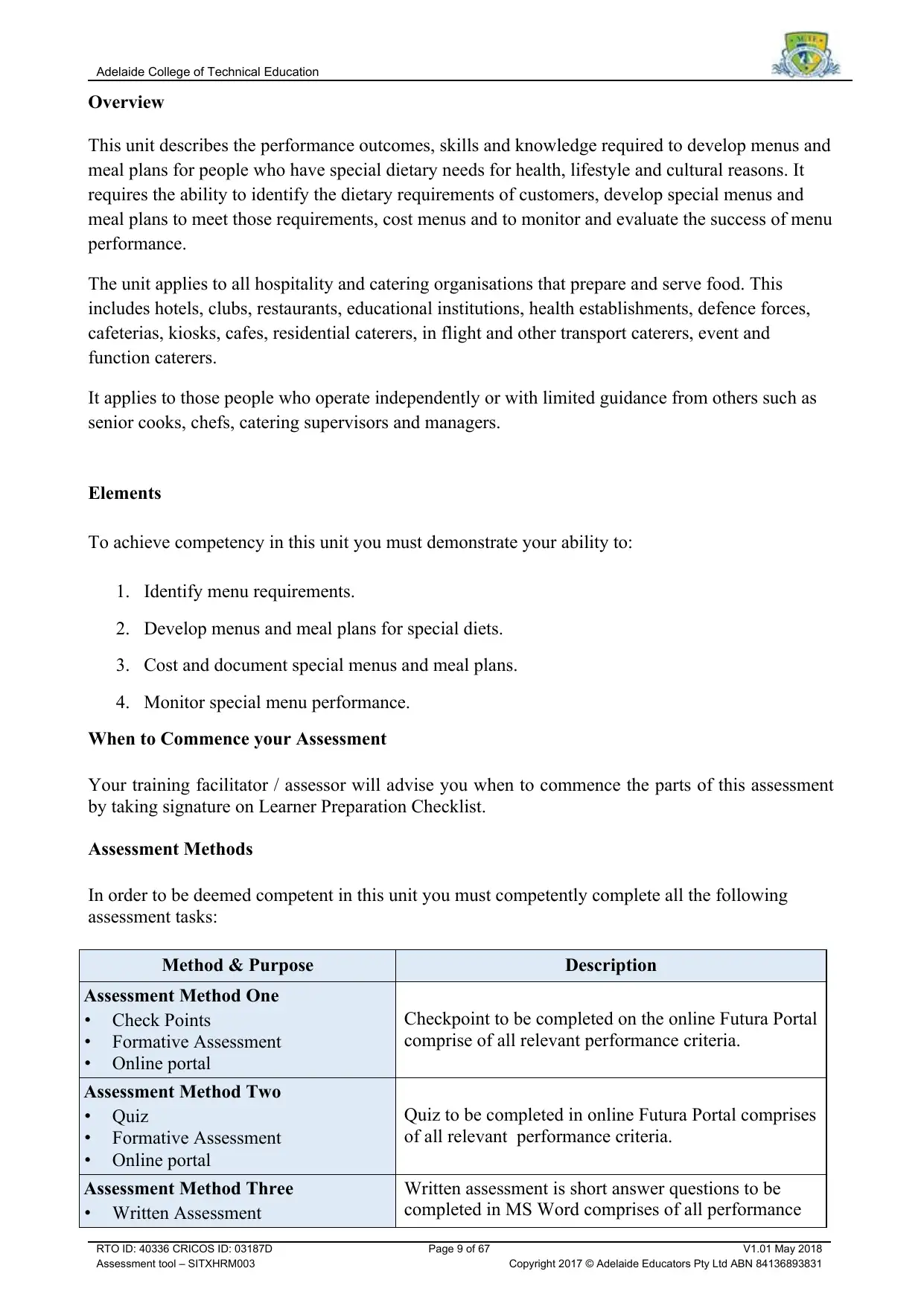
Adelaide College of Technical Education
Overview
This unit describes the performance outcomes, skills and knowledge required to develop menus and
meal plans for people who have special dietary needs for health, lifestyle and cultural reasons. It
requires the ability to identify the dietary requirements of customers, develop special menus and
meal plans to meet those requirements, cost menus and to monitor and evaluate the success of menu
performance.
The unit applies to all hospitality and catering organisations that prepare and serve food. This
includes hotels, clubs, restaurants, educational institutions, health establishments, defence forces,
cafeterias, kiosks, cafes, residential caterers, in flight and other transport caterers, event and
function caterers.
It applies to those people who operate independently or with limited guidance from others such as
senior cooks, chefs, catering supervisors and managers.
Elements
To achieve competency in this unit you must demonstrate your ability to:
1. Identify menu requirements.
2. Develop menus and meal plans for special diets.
3. Cost and document special menus and meal plans.
4. Monitor special menu performance.
When to Commence your Assessment
Your training facilitator / assessor will advise you when to commence the parts of this assessment
by taking signature on Learner Preparation Checklist.
Assessment Methods
In order to be deemed competent in this unit you must competently complete all the following
assessment tasks:
Method & Purpose Description
Assessment Method One
• Check Points
• Formative Assessment
• Online portal
Checkpoint to be completed on the online Futura Portal
comprise of all relevant performance criteria.
Assessment Method Two
• Quiz
• Formative Assessment
• Online portal
Quiz to be completed in online Futura Portal comprises
of all relevant performance criteria.
Assessment Method Three
• Written Assessment
Written assessment is short answer questions to be
completed in MS Word comprises of all performance
RTO ID: 40336 CRICOS ID: 03187D Page 9 of 67 V1.01 May 2018
Assessment tool – SITXHRM003 Copyright 2017 © Adelaide Educators Pty Ltd ABN 84136893831
Overview
This unit describes the performance outcomes, skills and knowledge required to develop menus and
meal plans for people who have special dietary needs for health, lifestyle and cultural reasons. It
requires the ability to identify the dietary requirements of customers, develop special menus and
meal plans to meet those requirements, cost menus and to monitor and evaluate the success of menu
performance.
The unit applies to all hospitality and catering organisations that prepare and serve food. This
includes hotels, clubs, restaurants, educational institutions, health establishments, defence forces,
cafeterias, kiosks, cafes, residential caterers, in flight and other transport caterers, event and
function caterers.
It applies to those people who operate independently or with limited guidance from others such as
senior cooks, chefs, catering supervisors and managers.
Elements
To achieve competency in this unit you must demonstrate your ability to:
1. Identify menu requirements.
2. Develop menus and meal plans for special diets.
3. Cost and document special menus and meal plans.
4. Monitor special menu performance.
When to Commence your Assessment
Your training facilitator / assessor will advise you when to commence the parts of this assessment
by taking signature on Learner Preparation Checklist.
Assessment Methods
In order to be deemed competent in this unit you must competently complete all the following
assessment tasks:
Method & Purpose Description
Assessment Method One
• Check Points
• Formative Assessment
• Online portal
Checkpoint to be completed on the online Futura Portal
comprise of all relevant performance criteria.
Assessment Method Two
• Quiz
• Formative Assessment
• Online portal
Quiz to be completed in online Futura Portal comprises
of all relevant performance criteria.
Assessment Method Three
• Written Assessment
Written assessment is short answer questions to be
completed in MS Word comprises of all performance
RTO ID: 40336 CRICOS ID: 03187D Page 9 of 67 V1.01 May 2018
Assessment tool – SITXHRM003 Copyright 2017 © Adelaide Educators Pty Ltd ABN 84136893831
⊘ This is a preview!⊘
Do you want full access?
Subscribe today to unlock all pages.

Trusted by 1+ million students worldwide
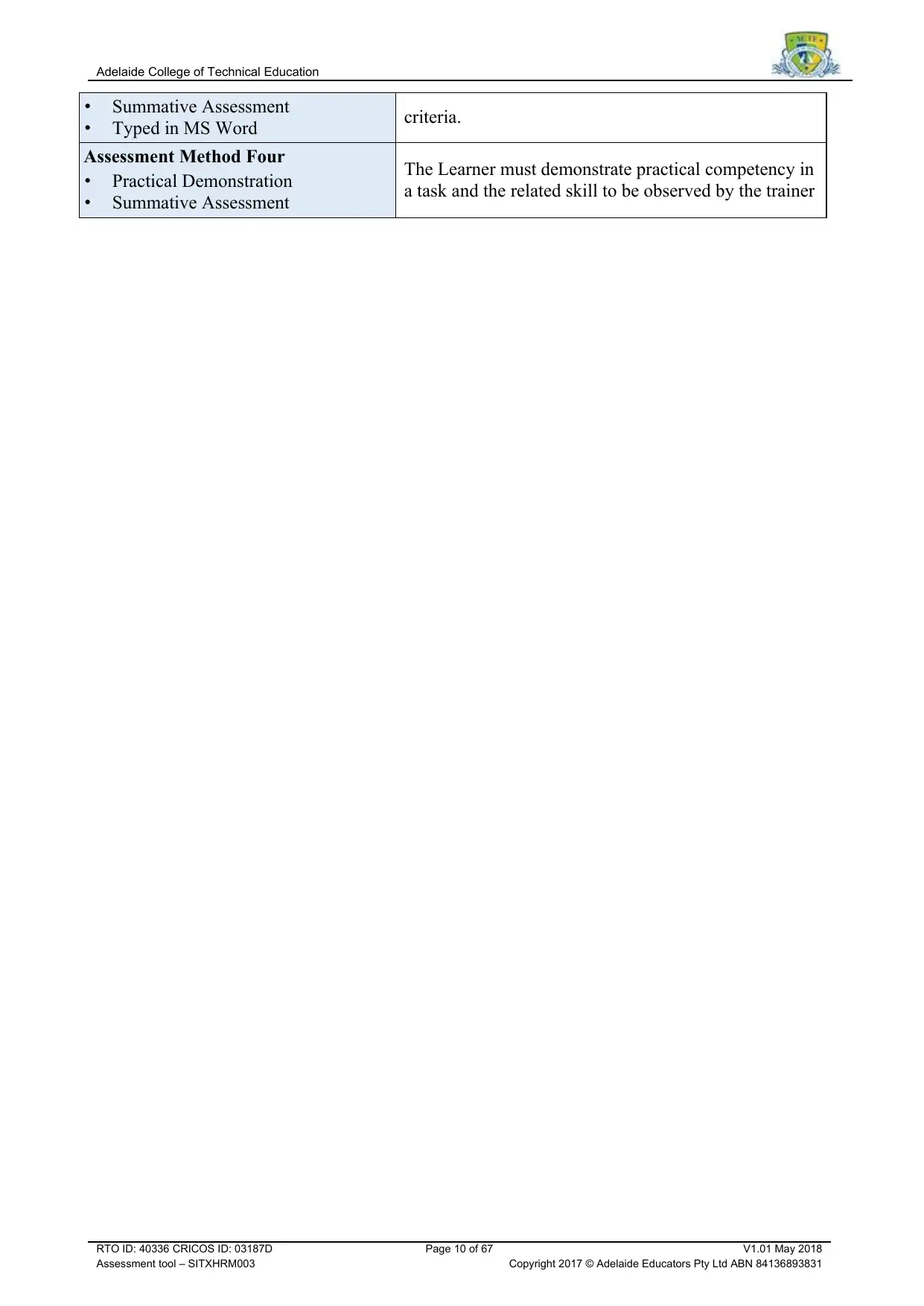
Adelaide College of Technical Education
• Summative Assessment
• Typed in MS Word criteria.
Assessment Method Four
• Practical Demonstration
• Summative Assessment
The Learner must demonstrate practical competency in
a task and the related skill to be observed by the trainer
RTO ID: 40336 CRICOS ID: 03187D Page 10 of 67 V1.01 May 2018
Assessment tool – SITXHRM003 Copyright 2017 © Adelaide Educators Pty Ltd ABN 84136893831
• Summative Assessment
• Typed in MS Word criteria.
Assessment Method Four
• Practical Demonstration
• Summative Assessment
The Learner must demonstrate practical competency in
a task and the related skill to be observed by the trainer
RTO ID: 40336 CRICOS ID: 03187D Page 10 of 67 V1.01 May 2018
Assessment tool – SITXHRM003 Copyright 2017 © Adelaide Educators Pty Ltd ABN 84136893831
Paraphrase This Document
Need a fresh take? Get an instant paraphrase of this document with our AI Paraphraser
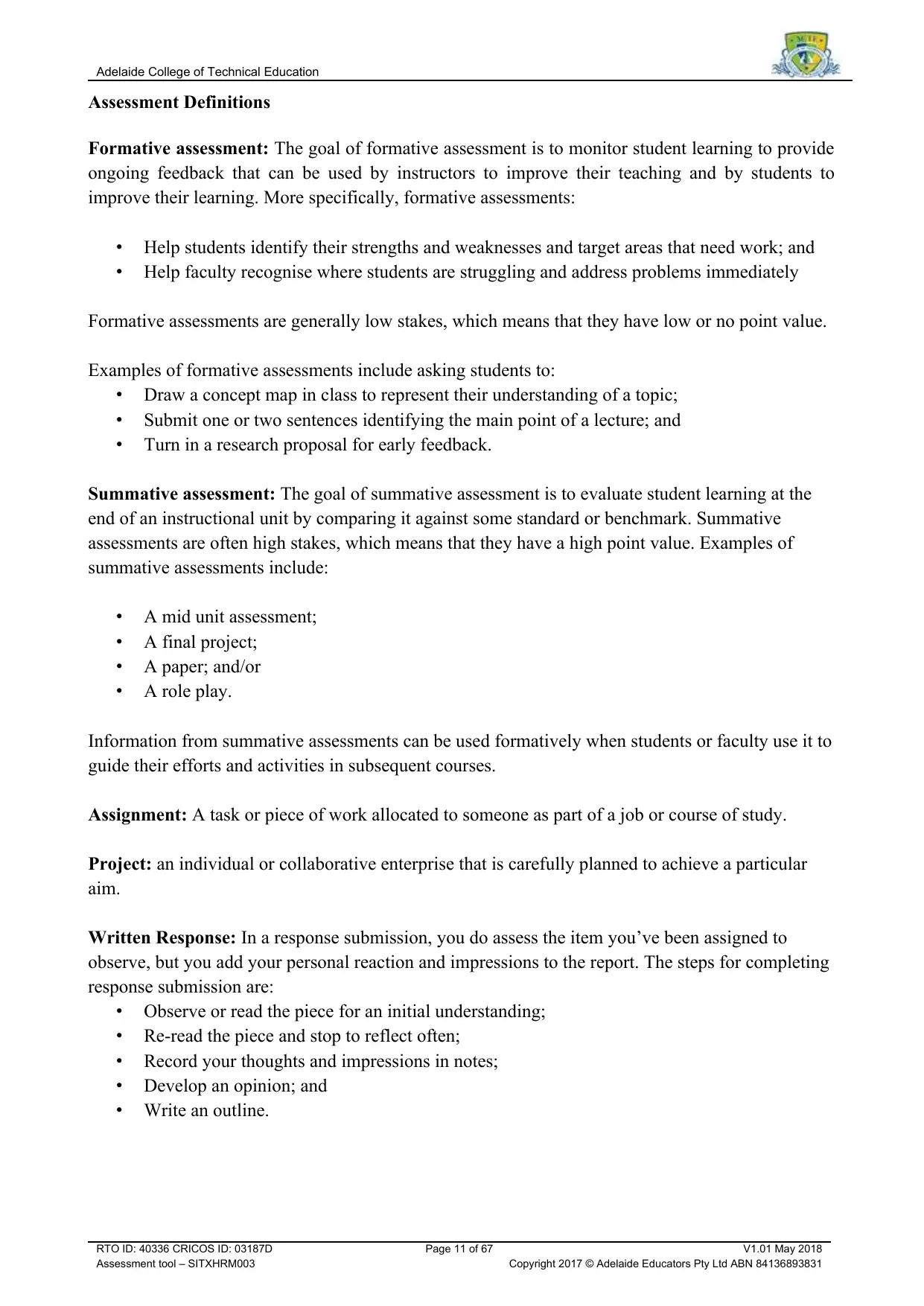
Adelaide College of Technical Education
Assessment Definitions
Formative assessment: The goal of formative assessment is to monitor student learning to provide
ongoing feedback that can be used by instructors to improve their teaching and by students to
improve their learning. More specifically, formative assessments:
• Help students identify their strengths and weaknesses and target areas that need work; and
• Help faculty recognise where students are struggling and address problems immediately
Formative assessments are generally low stakes, which means that they have low or no point value.
Examples of formative assessments include asking students to:
• Draw a concept map in class to represent their understanding of a topic;
• Submit one or two sentences identifying the main point of a lecture; and
• Turn in a research proposal for early feedback.
Summative assessment: The goal of summative assessment is to evaluate student learning at the
end of an instructional unit by comparing it against some standard or benchmark. Summative
assessments are often high stakes, which means that they have a high point value. Examples of
summative assessments include:
• A mid unit assessment;
• A final project;
• A paper; and/or
• A role play.
Information from summative assessments can be used formatively when students or faculty use it to
guide their efforts and activities in subsequent courses.
Assignment: A task or piece of work allocated to someone as part of a job or course of study.
Project: an individual or collaborative enterprise that is carefully planned to achieve a particular
aim.
Written Response: In a response submission, you do assess the item you’ve been assigned to
observe, but you add your personal reaction and impressions to the report. The steps for completing
response submission are:
• Observe or read the piece for an initial understanding;
• Re-read the piece and stop to reflect often;
• Record your thoughts and impressions in notes;
• Develop an opinion; and
• Write an outline.
RTO ID: 40336 CRICOS ID: 03187D Page 11 of 67 V1.01 May 2018
Assessment tool – SITXHRM003 Copyright 2017 © Adelaide Educators Pty Ltd ABN 84136893831
Assessment Definitions
Formative assessment: The goal of formative assessment is to monitor student learning to provide
ongoing feedback that can be used by instructors to improve their teaching and by students to
improve their learning. More specifically, formative assessments:
• Help students identify their strengths and weaknesses and target areas that need work; and
• Help faculty recognise where students are struggling and address problems immediately
Formative assessments are generally low stakes, which means that they have low or no point value.
Examples of formative assessments include asking students to:
• Draw a concept map in class to represent their understanding of a topic;
• Submit one or two sentences identifying the main point of a lecture; and
• Turn in a research proposal for early feedback.
Summative assessment: The goal of summative assessment is to evaluate student learning at the
end of an instructional unit by comparing it against some standard or benchmark. Summative
assessments are often high stakes, which means that they have a high point value. Examples of
summative assessments include:
• A mid unit assessment;
• A final project;
• A paper; and/or
• A role play.
Information from summative assessments can be used formatively when students or faculty use it to
guide their efforts and activities in subsequent courses.
Assignment: A task or piece of work allocated to someone as part of a job or course of study.
Project: an individual or collaborative enterprise that is carefully planned to achieve a particular
aim.
Written Response: In a response submission, you do assess the item you’ve been assigned to
observe, but you add your personal reaction and impressions to the report. The steps for completing
response submission are:
• Observe or read the piece for an initial understanding;
• Re-read the piece and stop to reflect often;
• Record your thoughts and impressions in notes;
• Develop an opinion; and
• Write an outline.
RTO ID: 40336 CRICOS ID: 03187D Page 11 of 67 V1.01 May 2018
Assessment tool – SITXHRM003 Copyright 2017 © Adelaide Educators Pty Ltd ABN 84136893831
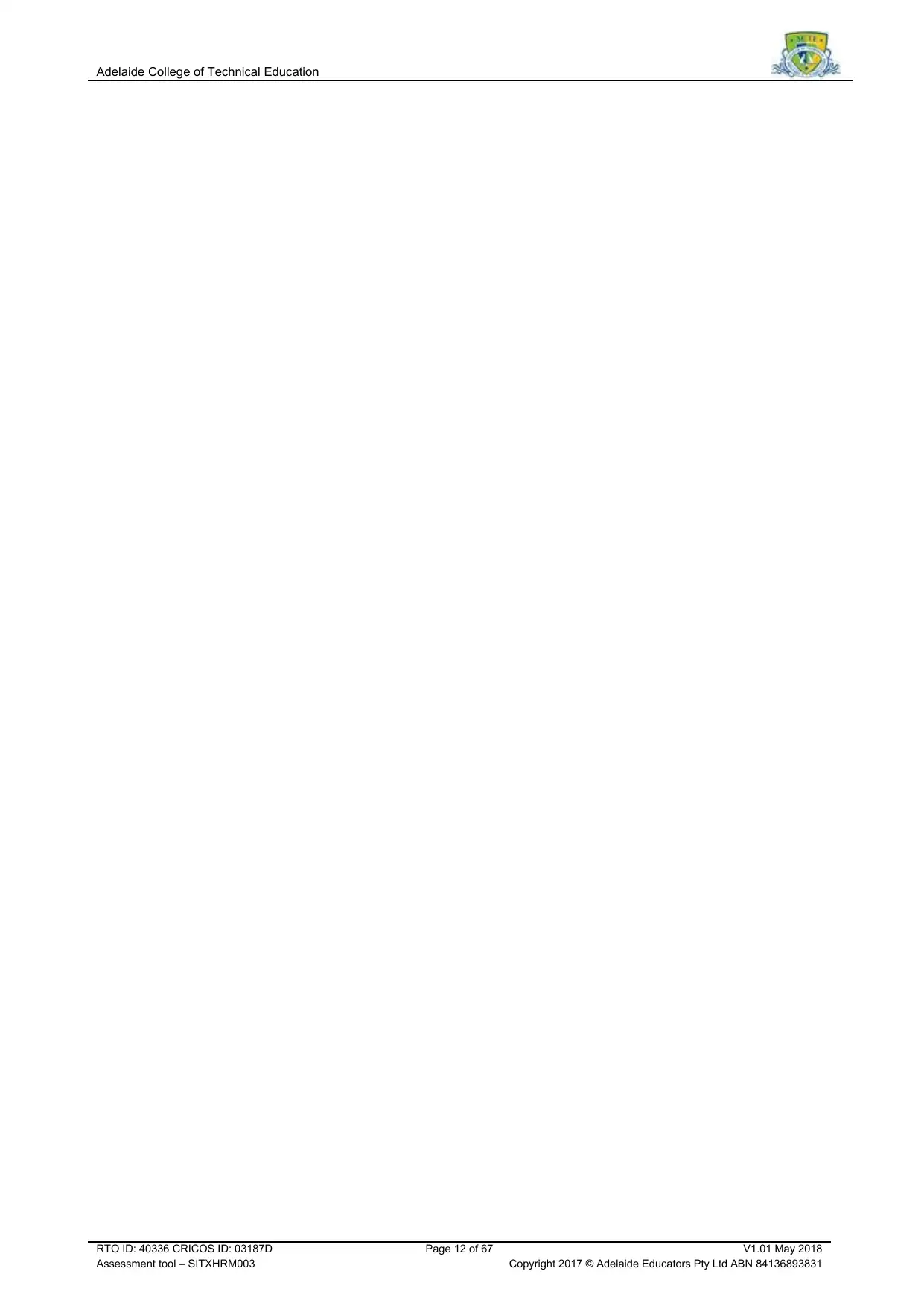
Adelaide College of Technical Education
RTO ID: 40336 CRICOS ID: 03187D Page 12 of 67 V1.01 May 2018
Assessment tool – SITXHRM003 Copyright 2017 © Adelaide Educators Pty Ltd ABN 84136893831
RTO ID: 40336 CRICOS ID: 03187D Page 12 of 67 V1.01 May 2018
Assessment tool – SITXHRM003 Copyright 2017 © Adelaide Educators Pty Ltd ABN 84136893831
⊘ This is a preview!⊘
Do you want full access?
Subscribe today to unlock all pages.

Trusted by 1+ million students worldwide
1 out of 67
Related Documents
Your All-in-One AI-Powered Toolkit for Academic Success.
+13062052269
info@desklib.com
Available 24*7 on WhatsApp / Email
![[object Object]](/_next/static/media/star-bottom.7253800d.svg)
Unlock your academic potential
Copyright © 2020–2026 A2Z Services. All Rights Reserved. Developed and managed by ZUCOL.





